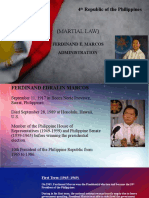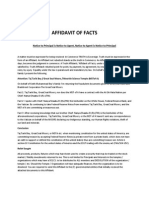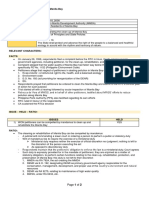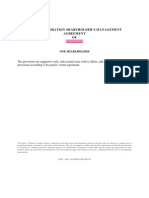Speech of President Aquino On The 40th Anniversary of The Declaration of Martial Law
Speech of President Aquino On The 40th Anniversary of The Declaration of Martial Law
Uploaded by
shuxiCopyright:
Available Formats
Speech of President Aquino On The 40th Anniversary of The Declaration of Martial Law
Speech of President Aquino On The 40th Anniversary of The Declaration of Martial Law
Uploaded by
shuxiOriginal Title
Copyright
Available Formats
Share this document
Did you find this document useful?
Is this content inappropriate?
Copyright:
Available Formats
Speech of President Aquino On The 40th Anniversary of The Declaration of Martial Law
Speech of President Aquino On The 40th Anniversary of The Declaration of Martial Law
Uploaded by
shuxiCopyright:
Available Formats
Speech of President Aquino on the 40th anniversary of the declaration of Martial Law (English)
Speech of His Excellency Benigno S. Aquino III President of the Philippines On the 40th anniversary of the declaration of Martial Law [This is a translation of the speech delivered at Bantayog ng mga Bayani, Quezon City] We have just arrived from Fort Magsaysay. You may recall then, in 1973, when my father was imprisoned in that camp for thirty days. His time in Fort Magsaysay was just a small portion of the seven years and seven months of hardship he experienced under the Marcos regime. And, come to think of it, he was merely one name among thousands in the list of Filipinos who were captured, jailed, and, if they were exceedingly ill-fated, killed, after Mr. Marcos allegedly signed the proclamation of Martial Law on the 21st of September, 1972. This is why we find ourselves here, looking up at this monument, giving recognition to each name carved on it. It is not just my father we pay tribute to on this day. Several Filipinos gave their lives to restore democracy, and we have set aside this day for their memory, their sacrifice, and their heroism: they are the heroes of the Martial Law era. Whether or not their names are carved on the heroes monument, our gathering here is a symbol of our collective gratitude for their bravery. Forty years have passed, and yet, to this day, the true details and events of Martial Law remain hidden from the public. One is the question of when Martial Law truly took effect. Many of you must be familiar with the video of the declaration, in which Marcos was sitting down, pointing at the camera, and seemingly staring down at the entire Filipino nation as he said: I signed Proclamation Number 1081 placing the entire Philippines under Martial Law. This happened on the 23rd of September. The question now is: If Marcos signed the proclamation on the 21st of September, why did he wait for two days before making it public? The answer: so that he could temporarily conceal Martial Law from the public, to give himself enough time to hunt down and take by surprise those who opposed his policies. This is why, on the 22nd of September, my father was arrested, and so were a number of personalities and civilians who were known threats to the regime that Marcos was building. Little did the public know that on the same day, the former President also released his first, and one of his worst decrees as dictator: General Order No. 1, which states that all power, as well as all operations of the entire government, would be under the control of a single person: Mr. Marcos. The increasing number of crimes and the worsening state of rebellions: these were the reasons Marcos gave to justify Martial Law. He also said that his intention was to undertake reforms in our countrys social, livelihood, and political institutions. The line his propagandists took: if an iron fist exists in South Korea and Indonesia, then why not in the Philippines too? His message was clear: if you want to save our country from imminent collapse, then you must give me your freedom. At first glance, it seemed like a straightforward policy. After all, if you were not affiliated with plans to bring down the government, then you had nothing to fear; you were
absolved. But the problem was: the moment you questioned Marcoss decisions, you were made to pay. I was only 12 years old then, and I did not have any idea of the monumental effect September 1972 would have on our family. Yes, I knew that my father was busy and also anxious on the days leading up to the declaration of Martial Law, but as a child, I did not give it much attention. I did not know, for example, that the streets would be filled with checkpoints. That they could stop the printing of papers and shut down radio stations. They could even have our favorite television programs stopped. If you expressed your opinion, and it differed with that of Marcos, then you could be arrested. If you did something that Marcos simply didnt like, they would immediately put you in jail. In those thirteen years, the Marcos regime had their way with our laws and placed the interest of the common people in jeopardy. He wrote his own constitution, and pushed it in a Constitutional Convention for a vote. When he found that the constitution would probably lose a plebiscite, he changed the rules once again. Instead, there was a simple raising of hands in each barangay: a move undoubtedly fueled by cronyism and cheating. Because of this constitution, he padlocked Congress and took from them their power. Even the Supreme Court, based on their decision on the Javellana versus Executive Secretary case back in March 1973, showed that Marcos new Constitution was in effect. He succeeded in amassing all the powers of the state, and plunged our country into abyss of dictatorship. Come 1978, the peoples collective doubt of the sincerity of Martial Law began to solidify. Those who used to turn a blind eye to the questionable goings on in society were slowly overcome by disappointment and anger. They could not sit back and keep quiet at the unexplainable disappearances of civilians. They grew tired of shutting their eyes to the corrupt practices and the abuse of soldiers and government officials. Even the soldiers used by the regime to spread intimidation, fear, and violence, were beginning to ask: Are we still doing the right thing? If we are truly soldiers of the people, why are we being ordered to hurt our defenseless fellowmen? The dictatorship spared no one. Every person was victimized by Martial Law. Every person, including our soldiers. And on the night of the 6th of Aprilon the eve of the election for the Interim Batasang Pambansaone could hear thousands of Filipinos who had joined a noise barrage to support my fathers party, in defiance of the dictatorship. Though my fathers party may not have won the election, the noise of the protest paved the way for many more demonstrations. In schools. In plazas. In government offices. The people went everywhere, just so they could share their unified concerns: Enough is enough. Weve had it. He must go. As reaction to the disapproval coming from other nations, Marcos formally lifted Martial Law in 1981. But, as expected, Marcos still wanted the upper hand. Because of his constitutional amendments, he still held absolute power over the country. In short, they made a fool of Juan dela Cruz. Until we reached the incident that sparked a revolution: on the tarmac of the airport, even before he could once again step on our native soil, the sound of gunshots resounded in the air. My father was assassinated. This signaled the start of the revolution. The Filipinos who once said: Lets give Marcos a chance; it might work, became the opposition who asked: If they could do this to a former Senator, what more could they do to common citizens like us? Doubt shrouded Marcos even further when the entire world witnessed 29 computer technicians walk out as a sign of protest against Marcos blatant manipulation of the election in 1986. Millions of people flocked to EDSA to finally let Marcos know that they are tired of Martial Law. Nuns walked head-on against tanks; our soldiers and ordinary people stood arm-in-arm in the middle of the rally. We
overthrew a dictatorship peacefully; we ended Martial Law through our faith and trust in one another. I wish to make it clear: we won back our democracy not because of the assassination of my father. We reclaimed it because we had hundreds of heroes who committed to fight for the rights of those in the margins; because there were those who insisted on fighting for our freedom, so that they could depose those who acted as if they were kings; because there are those who refuse to be enslaved by a dictator, and instead stand up for the rights of their fellowmen; because there are many other martyrs who freed themselves from the chains of the Marcos regime, at the cost of their lives. Sometimes, I do not know whether to laugh or cry whenever I hear someone insisting that life was better during Martial Law. There were many conflicting opinions during that period, and perhaps I cannot blame those of our countrymen who take Mr. Marcos sidewho say that if Martial Law continued, then, surely, our country would be better and more developed by now that we would be living in a New Society. They have a right to express their own opinion, and we respect that right. But while we try our best to be fair to these people, I wish they could look us in the eye and answer us when we ask them this: Did we gain anything from Martial Law? Im sorry, but I will not allow people to be misled by the skewed perceptions of a few. Let us be honest. If Martial Law was supposed to be the solution that would bring down crime, why were we showered with news of disappearances, salvages, and summary executions? If Martial Law was the solution that would stunt the growth of communism, then why is it that, according to the book Dictatorship and Revolution: Roots of Peoples Power, the number of people in the NPA grew from 1,250 in 1972 to an estimated 40,000 in 1983? If Martial Law was the solution that would improve the economy, why is it that the value of the peso dropped from four pesos to one dollar, to twenty-five pesos to one dollar, during Marcos time in office? Is this the promise of the New Society? You be the judge. To make certain that the information we pass on to our children is based on true historical events, I have tasked the National Historical Commission of the Philippines to form a commission, whose purpose is to thoroughly collect experiences and stories from individuals who were alive during the Martial Law era. We wish to ensure that only the truth will be printed in the books of our studentsnot the collected lies of propagandists and not the deceitful clippings of revisionists. There is a saying: Those who forget the mistakes of the past are bound to repeat it. Let us not allow our rights and our freedom to ever be imperiled again. I will not bequeath the mistakes of history to the coming generations. Let us value the lessons of Martial Law. It is the task of each and every one of us to uphold these lessons, by becoming our brothers keepers and by recognizing the hardships and sacrifices my father, and other victims of Martial Law, undertook. We will turn the crooked principles and beliefs onto the straight path, so that we may help everyone remember the value of democracy and freedom, as well as the love for nation displayed by the Filipinos who fought against the dictatorship. Only truth and integrity will guide us on the straight path. Never again will we go astray, and our bequest to youto our youthwill be a nation illuminated by justice and freedom. Thank you.
You might also like
- Research Paper Martial LawDocument15 pagesResearch Paper Martial LawJerico EdulanNo ratings yet
- Rage Into Courage: Mindanao Under Martial Law (Volume 1), Activists Against The MarcosDocument2 pagesRage Into Courage: Mindanao Under Martial Law (Volume 1), Activists Against The MarcosPinky EclarinalNo ratings yet
- Local Government PresentationDocument13 pagesLocal Government PresentationJJ PernitezNo ratings yet
- Martial Law RefenceDocument13 pagesMartial Law RefenceGinNo ratings yet
- PT Reflection Paper - BIOCODocument2 pagesPT Reflection Paper - BIOCOAlthea Joy Sincero BiocoNo ratings yet
- Script 1973Document4 pagesScript 1973Cristina NamuagNo ratings yet
- Marasigan Mark Res 2Document12 pagesMarasigan Mark Res 2Gab MarasiganNo ratings yet
- Reaction PaperDocument5 pagesReaction PaperAramae Bacho70% (10)
- Cortes, Keith Jason Bsmls-2A EDSA People Power Revolution (Age of Revolution)Document2 pagesCortes, Keith Jason Bsmls-2A EDSA People Power Revolution (Age of Revolution)Keith Jason CortesNo ratings yet
- YDocument26 pagesYLovely VallescasNo ratings yet
- The King of Everything 2Document5 pagesThe King of Everything 2ZADRACK FIELNo ratings yet
- Martial LawDocument1 pageMartial LawLucas satosNo ratings yet
- Life During Martial LawDocument8 pagesLife During Martial LawLou GatocNo ratings yet
- English Reflection Paper On Martial LawDocument2 pagesEnglish Reflection Paper On Martial LawLeila PanganibanNo ratings yet
- Batas MilitarDocument3 pagesBatas MilitarKim Kim Albutra50% (4)
- Martial LawDocument5 pagesMartial Lawgloren abutalNo ratings yet
- Batas MilitarDocument2 pagesBatas MilitariamleleiNo ratings yet
- Cabuyoc, Darrel L. 12 - Zeus (Humss) Major OutputDocument6 pagesCabuyoc, Darrel L. 12 - Zeus (Humss) Major Outputcabuyocdarrel2No ratings yet
- T S P M L: HE Pirit OF Hilippine Artial AWDocument6 pagesT S P M L: HE Pirit OF Hilippine Artial AWPia Eleanor SantosNo ratings yet
- Batas Militar - Documentary ReflectionDocument4 pagesBatas Militar - Documentary ReflectionCharmie Lhyn LapeNo ratings yet
- Revilla - Midterm ExamDocument5 pagesRevilla - Midterm Examrose revillaNo ratings yet
- Martial LawDocument3 pagesMartial LawdarrieemilkNo ratings yet
- Ps 6 Corazon AquinoDocument7 pagesPs 6 Corazon AquinoMae Anne CastroNo ratings yet
- Reaction Paper On The Senator Jose Wright Ka Pepe Diokno DocumentaryDocument3 pagesReaction Paper On The Senator Jose Wright Ka Pepe Diokno DocumentaryFhey UntalanNo ratings yet
- FINAL How Did The EDSA People Power of 1986 Empower The Filipino MassesDocument4 pagesFINAL How Did The EDSA People Power of 1986 Empower The Filipino MassesBe NjNo ratings yet
- GEC 2 - Chapter 2, Lesson 5 - Pres. Cory Aquino's Speech Before US CongressDocument29 pagesGEC 2 - Chapter 2, Lesson 5 - Pres. Cory Aquino's Speech Before US CongressAquila Lynx Fornax FørsÿthêNo ratings yet
- Project RPH 101 PDFDocument8 pagesProject RPH 101 PDFJomar ArcillaNo ratings yet
- Philippine HistoryDocument8 pagesPhilippine HistoryBal SagothNo ratings yet
- Argumentative EssayDocument4 pagesArgumentative EssayPrincess Morales Ty100% (1)
- Con. I Activity (Martial Law)Document2 pagesCon. I Activity (Martial Law)ROQUE XanderNo ratings yet
- Position PaperDocument1 pagePosition PaperNea Jane CabeltisNo ratings yet
- Martial Law PHDocument6 pagesMartial Law PHAngel JuNo ratings yet
- MARQUEZ. Reaction Paper On Martial LawDocument2 pagesMARQUEZ. Reaction Paper On Martial LawROZAN CHAYA MARQUEZNo ratings yet
- A History of The Philippine Political ProtestDocument3 pagesA History of The Philippine Political ProtestAsunaNo ratings yet
- DEBATEDocument2 pagesDEBATEnikol crisangNo ratings yet
- Primary Source & Secondary Source ReaphisDocument3 pagesPrimary Source & Secondary Source ReaphisGab VillaflorNo ratings yet
- RecapDocument1 pageRecapMarlyn Mae FaraonNo ratings yet
- Batas MilitarDocument3 pagesBatas MilitarRomelyn Angadol100% (2)
- Lesson 5Document2 pagesLesson 5Bryle Xyruaphyme Georvi CabugNo ratings yet
- Martial Law Goal: Develop The Understanding of Each Students Regarding The Impact of Proclamation of Martial Law On The Year 1972 UpDocument2 pagesMartial Law Goal: Develop The Understanding of Each Students Regarding The Impact of Proclamation of Martial Law On The Year 1972 UpMaumie TsutsuiNo ratings yet
- Martial Law Position PaperDocument5 pagesMartial Law Position Papergloren abutalNo ratings yet
- Phil HisDocument6 pagesPhil HisMargielyn SuniNo ratings yet
- (Martial Law) : 4 Republic of The PhilippinesDocument29 pages(Martial Law) : 4 Republic of The PhilippinesJames Ryan AyubanNo ratings yet
- Persuasive EssayDocument3 pagesPersuasive EssayRinalyn AsuncionNo ratings yet
- The Declaration of Martial Law by Ferdinand MarcosDocument5 pagesThe Declaration of Martial Law by Ferdinand MarcosEla Sofia ArnaizNo ratings yet
- Content & Contextual ANALYSIS of "Speech Before The by Corazon AquinoDocument9 pagesContent & Contextual ANALYSIS of "Speech Before The by Corazon AquinoYurika Jane PinedaNo ratings yet
- Ferdinand Emmanuel Edralin Marcos: The 10 President of The Republic of The PhilippinesDocument34 pagesFerdinand Emmanuel Edralin Marcos: The 10 President of The Republic of The PhilippinesTimoy Cajes100% (1)
- Declaration of Martial LawDocument5 pagesDeclaration of Martial LawLliana MarcelNo ratings yet
- Maria Corazon Cojuangco AquinoDocument17 pagesMaria Corazon Cojuangco AquinogailNo ratings yet
- Chiswisgonzales: 11 Answers 1.2K People HelpedDocument3 pagesChiswisgonzales: 11 Answers 1.2K People HelpedJack DingalNo ratings yet
- CHAPTER 23 - Readings in Philippine History in PPT FormatDocument26 pagesCHAPTER 23 - Readings in Philippine History in PPT FormatDagoy, Meguela Angela B.No ratings yet
- Case Study - Martial LawDocument13 pagesCase Study - Martial LawcamilleNo ratings yet
- UntitledDocument3 pagesUntitledNicka Leih PaculbaNo ratings yet
- Hiponia - FC2 Cas1 51Document3 pagesHiponia - FC2 Cas1 51hiponialorlyanne17No ratings yet
- Declaration of Martial LawDocument4 pagesDeclaration of Martial LawSantos CathyNo ratings yet
- Batas Militar - Martial Law in The PhilippinesDocument3 pagesBatas Militar - Martial Law in The PhilippinesRinalyn AsuncionNo ratings yet
- Marcos BurialDocument3 pagesMarcos BurialfaithszarinahNo ratings yet
- A Reflection Paper On Martial LawDocument2 pagesA Reflection Paper On Martial LawsamNo ratings yet
- RPH Lesson 2.5 Revisiting Corazon Aquinos SpeechDocument22 pagesRPH Lesson 2.5 Revisiting Corazon Aquinos SpeechKent RodriguezNo ratings yet
- (HISTO) Final PaperDocument5 pages(HISTO) Final PaperMAIA THERESE CORONELNo ratings yet
- The Peace Negotiations - LansingDocument9 pagesThe Peace Negotiations - LansingLaurence SebiosNo ratings yet
- Supreme Court E-Library SearchDocument39 pagesSupreme Court E-Library SearchDevonee WoopNo ratings yet
- Kenya WordDocument4 pagesKenya WordJanaky VasuNo ratings yet
- Limbona v. Comelec GR 186006, Oct 16, 2009Document5 pagesLimbona v. Comelec GR 186006, Oct 16, 2009Elisa JordanNo ratings yet
- In Water LawDocument7 pagesIn Water LawABI BROS • AKM ClothingNo ratings yet
- Risos - Vidal V ComelecDocument2 pagesRisos - Vidal V Comelec上原クリスNo ratings yet
- Matibag v. BenipayoDocument6 pagesMatibag v. BenipayoKarla BeeNo ratings yet
- Affidavit of FactsDocument2 pagesAffidavit of FactsKeith Muhammad: Bey100% (1)
- Legeth Cases 1Document158 pagesLegeth Cases 1RenceNo ratings yet
- Semi Final Memo DraftDocument9 pagesSemi Final Memo DraftSindrala paul0% (1)
- Tañada V TuveraDocument3 pagesTañada V Tuveraadrianmdelacruz100% (1)
- Thomas v. Collins, 323 U.S. 516 (1945)Document31 pagesThomas v. Collins, 323 U.S. 516 (1945)Scribd Government DocsNo ratings yet
- MMDA v. Concerned Residents of Manila BayDocument2 pagesMMDA v. Concerned Residents of Manila BayDan AbaniaNo ratings yet
- Trade Union ActDocument23 pagesTrade Union ActAditya Kulkarni100% (1)
- Comparative Constitutional Law - Introduction PDFDocument21 pagesComparative Constitutional Law - Introduction PDFGonzalo BravoNo ratings yet
- FdsDocument2 pagesFdsRyan AcostaNo ratings yet
- Consolidated Tax Case DigestDocument17 pagesConsolidated Tax Case Digestcarlota ann lafuenteNo ratings yet
- The Priority Development Assistance Fund (PDAF) A.K.A. Pork BarrelDocument91 pagesThe Priority Development Assistance Fund (PDAF) A.K.A. Pork BarrelchinchayNo ratings yet
- Alzate v. Aldana DigestDocument2 pagesAlzate v. Aldana Digestkim_santos_20No ratings yet
- Beluso v. Municipality of Panay, G.R. No. 153974, August 7, 2006Document6 pagesBeluso v. Municipality of Panay, G.R. No. 153974, August 7, 2006FD BalitaNo ratings yet
- Close Corporation Shareholder's Management AgreementDocument4 pagesClose Corporation Shareholder's Management AgreementDiego Antolini0% (1)
- The Kerala State Handloom Weaver's Co-Operative Society (Special PDFDocument5 pagesThe Kerala State Handloom Weaver's Co-Operative Society (Special PDFneet1No ratings yet
- 13 CruzanvDir - Missouri FordanDocument2 pages13 CruzanvDir - Missouri FordanDanielle LimNo ratings yet
- Constitutional Basis: Right To InformationDocument9 pagesConstitutional Basis: Right To Informationsandhya lakshmanNo ratings yet
- Bloomberry Resorts and Hotels, Inc. vs. Bureau of Internal RevenueDocument13 pagesBloomberry Resorts and Hotels, Inc. vs. Bureau of Internal Revenuevince005No ratings yet
- Case Analysis Kesavananda Bharati V State of Kerala BY SUBHASHDocument6 pagesCase Analysis Kesavananda Bharati V State of Kerala BY SUBHASHshwetaskasbeNo ratings yet
- 1935 ConstitutionDocument23 pages1935 ConstitutionJohnAndrew AquinoNo ratings yet
- Free Speech QuizDocument1 pageFree Speech QuizpeterdarinkleinNo ratings yet
- Mitch Williams - Civ Pro 2 - Keele - "Script" Outline: Subject Matter JurisdictionDocument8 pagesMitch Williams - Civ Pro 2 - Keele - "Script" Outline: Subject Matter JurisdictionMitch WilliamsNo ratings yet

























































































